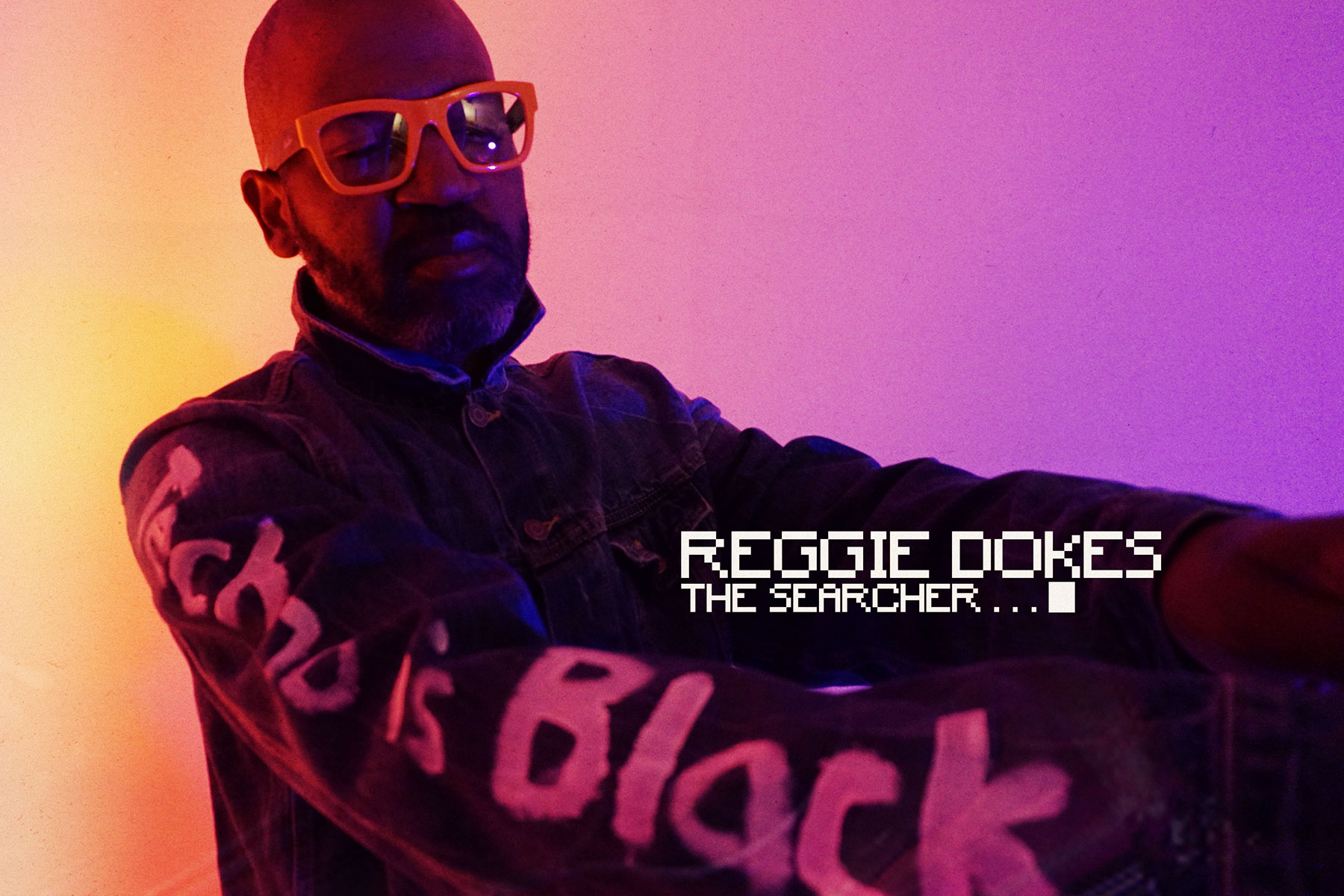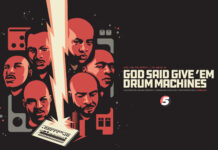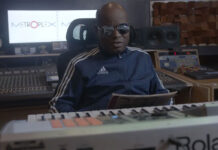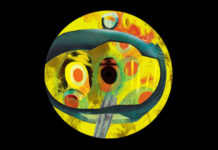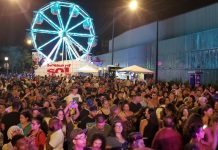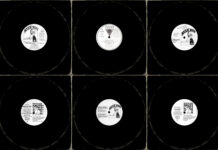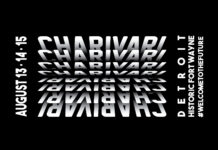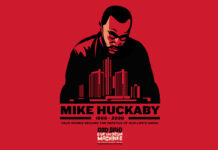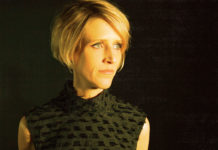Reggie Dokes is a producer, a DJ, a composer for films and a 100% pure Detroit electronic music artist. Though he’s released records on influential labels and played big shows in cities around the world, Reggie is at heart a seeker, a follower in the tradition of great Black diaspora seekers like Sun Ra. His music is heady, introspective and interstellar, and it’s constantly in friction against anything that tries to trim its edges or fence it in. His techno can be meditative, almost calming; his soulful, deep tracks energetic and galactic. His deep house tracks bear a startlingly unique and personal signature. They’re all part of one whole — in his own words, “experimental, soulful, eclectic, spiritual, all of those things wrapped into one.”
The son of a music teacher, Dokes was born and raised and educated in Detroit. After a beautifully misspent youth DJing backyards, basements and any other party he could find, Dokes began to play in the clubs and release his own music on his label Psychostasia. Over the years he’s dropped tracks on Soulphiction‘s Philpot, We Play House, Prime Numbers, Sistrum, Shift Imprint, Finale Sessions, Transmat, Deep Explorer, Clone, Mate, Rawax, People Of Earth and more. He left house behind after moving to Atlanta in 2007, only to pick it back up some years later after a conversation with DJ Spinna on how to work in house and hip hop at the same time without feeling obligated exclusively to either. From imagining that he’d “show up on TI’s doorstep with my keyboard and try to get a production deal for hip hop,” Dokes’ new electronic releases made in Atlanta attracted new fans and a new appreciation for his eclectic sound.
Dokes continues push back the boundaries with a new career working extensively (but not exclusively) in TV and film. He composed the music for the Detroit techno documentary God Said Give ‘Em Drum Machines, though as Dokes began listing the shows he’s composed music for in the last few years, I began to realize I’d actually seen most of them.
This is not an interview built around the announcement of a record, or an album, or a gig, though Dokes has records and albums and gigs coming all the time. Dokes is one of the most fascinating artists to emerge from Detroit in the ’00s, creator of some of the most exhilarating records in my collection, and I wanted to know more about the person behind this music.
Reggie Dokes photos by Nile Dokes
I started seeing your name associated with God Said Give ‘Em Drum Machines in some of the podcasts that they made a few years back, and you composed the music for the final cut. How did you get involved with the documentary?
I’ve known Kristian Hill since high school. We knew some of the same people but didn’t run in the same circles — that’s just how the scene was in Detroit back then. I’d gotten to the point in my career where I wanted to compose for TV and film. I kept in contact with Kristian through Instagram, and he was posting stuff about working on this film. So I called him and was like, Yo bro do you guys need a composer for the film? He was like “You’ve got the job!” [laughs] That was easy! I love composing! But truthfully, he told me it wasn’t working out with the person they had prior, so I was right on time.
That was how I got my feet wet with composing for film. It’s been like a two and a half year journey working on the documentary. We got to the halfway point and decided to take a break. During the break, lo and behold Kristian decided he needed to do a new cut of the film. He sent me the new cut, I watched it and it was like a whole ‘nother film. So all the music that I had done from the beginning up to that point where we stopped wasn’t really working anymore with the new cut. He didn’t want to say it but I did. He felt better that I said it. So we went back to the beginning and started all over with the music.
Were you able to reuse any of it?
Some of it. One thing I’ve learned about this process and composing is that some scenes really don’t need music. Sometimes the scene can carry itself. Other times after talking with Kristian I felt like a scene needed something a little more heady, a little more melodic, it didn’t have to be a beat or an actual cue, if you will. Some of it we were able to use but for the most part I just started over.
And I’m so glad that I was a part of the film because I lived this shit, man, you know what I mean? It was really great for me to connect and relate to what was going on, because I lived it.
I remember Chip E telling me that he set out to make his own documentary after working on someone else’s film and feeling like they missed the story of house music. As a Detroit techno producer and DJ who was around during these events, what was your reaction when you watched the final cut of GSGEDM?
One thing I’ve learned is that a lot of shit gets left on the floor. It’s probably safe to say that a lot of that is going to be “Part 2.” [laughs] Because the story, to me, is one that needs to be told and it has a lot of tentacles. It starts at a certain point and it branches out into other artists that we were not able to mention or that were left out in this film. Going through this process, Kristian would ask me my opinion and I would humbly give it. Like I would say I think we’re doing a balanced job here, or that I thought it was important that we talked about Chicago’s influence on Detroit. Because it had a huge influence. I’ve been a DJ since I was 14, man, a lot of those records initially were Chicago records. Steve “Silk” Hurley, Farley, Chip E., a lot of those Chicago records had a tremendous influence on me. It was so important to speak on that and our relationship with Chicago and how this music came out of a predominantly Black and gay scene. In terms of Detroit, when I look back on it I realize we were just so fortunate to have experienced that time. You’re talking about kids who were doing this. As raw as it was it was something different, something unique.
Overall I’m proud of the film, I really am. You only get two hours to tell a story and, like I said, I think there’s going to be a “Part 2” because there are so many unsung heroes in Detroit in particular that we had to leave out. We essentially wanted this first one to center around Juan, Kevin, Derrick, Eddie, Santonio and Blake, the guys who really made this shit what it is. Firstly starting with Juan, he’s the godfather of it all. When Kristian explained to me what was going on when I first started working with the project, I knew this was important. I knew this was significant. I knew this was a story that needed to be told.
I remember the first time Kenny Dixon Jr, took me upstairs to his studio. I was like ‘Dude you gotta be fucking kidding me. This is it?!’ There was a Rhodes keyboard in the corner. Across from that was a DJ set-up, and then he had like his recording equipment. I mean it was very low-end. That always stuck with me.
Let’s go back to your youth. I read your dad was a music teacher, is that right?
Yes, that’s where it all comes from. He was a musician, formally trained and educated in music. My dad was a music teacher for 20+ years in the Detroit public school system. He never really pressured me to learn an instrument or to take lessons but he created this environment where I wanted to learn. I grew up in the drum section marching with him in the band. My dad taught marching band, concert band and stage band. Whenever he had school recitals, I was there. Whenever he had to play at football games, I was there. Music was always a huge influence on my life.
The first instrument for me was viola, then a little bit of guitar, and from there drums. Specifically what they call “concert snare,” so that would be snare for orchestra. That I was formally trained on. To this day, drums are my shit. People have affectionately called me a beat junkie and I am. I just love drums, man, I love percussion. But that’s where it all came from, my dad, for sure.
Did he understand DJing in the modern context?
No, he didn’t. He saw how much time I was spending with it. Even in high school he bought me some of my first records. I remember it was actually a disco record — Martin Circus. That record was like fifty fucking dollars for one side! I remember begging my dad, “Please, buy me this record! I gotta have it for my collection so when I play out —” There was this great record store in Detroit called Buy-Rite, run by this great dude named Cliff Thomas. What’s crazy is that Cliff was actually distributing a lot of those guys’ records in the beginning, like Derrick and Kevin, he was putting their records out. This dude had this great record shop. Here we are, I’m 15 or 16 years old. My dad is like “Dude, that record is $50.” I begged him and told him I would be the shit if I had this record in my little milk crate.
So yeah he bought that record. He was like, okay, for you to be collecting vinyl like this at these prices? I guess you’re serious. You know, I really wasn’t good at football or baseball or any sports. I fell in love with DJing. Sometimes that shit would get on his nerves, though. “Reggie did you do your homework? You’ve been down there for hours playing that fucking music …” But when I started to travel with it, he was like okay — he got me. It was my mom who was kind of resistant at first. “Boy, you really need to get you a real job with some benefits. You’re out here trying to DJ in Europe and shit.” But once she started seeing my name in the press and reviews she was like okay, you’re starting to do something here and she got on board.
So you have kids now. If one of them said they wanted to be a DJ, would you be more like your mother or your father?
That’s a great question. I would side on my dad’s side of it because I’m a creative. You know what I mean? Ironically my son is a creative too, he’s in film school. I remember wanting him to attend Morehouse, where I went to school. He had other plans, he didn’t want to go to Morehouse and he didn’t want to continue the tradition. I had to learn a hard lesson there, that this is his life. If my daughter also picked a career as a creative I would support it 100%. I really would. I know what it’s like when you’re just working for a check and you don’t care for the job or the people you work with but you do it because you need to keep the lights on. I’ve come to that point where it’s like hey, it’s their life, they see how much work I put into it and how I’ve struggled and challenges I’ve faced with this shit but how if you stay persistent, things begin to open up for you.
I like to think people are on a journey, creative people especially write the story in their head of where they began and where they want to finish. Where did you think it would go, when dropping those first records, and where did you see yourself going? Where do you see yourself going now?
Earlier on I saw myself being this great international DJ traveling the world every week playing in fabulous clubs. That’s where my head was. That was my goal. A lot of that I give credit to Derrick May because he was the one that really exposed me to that life. He showed me you could make a decent living as a professional DJ. I only started producing because nobody was putting me on. That’s how my Psychostasia Recordings label was born, basically.
Now after going through all that shit — your journey as you put it — it’s clear where I am heading which is composing. That’s where all my energy is and all my focus, is which is composing for TV and film. I see myself eventually doing live performances. That’s a challenge that I want to take on because as a creative it’s always important to challenge yourself. We get comfortable sometimes. It’s always good to shake things up.
How would you describe your sound? I’ve always thought it was heady, mental, maybe I’d say “experimental but danceable.” It was experimental but you had something for the DJs to mix into. How would you describe it?
Actually… when I first started putting records out on my label, I didn’t give a shit about the dancefloor. That was my attitude. In the beginning it was kind of rough to really push the records because let’s face it, a lot of distributors, their concentration was the dancefloor, not the moody, heady type shit which is where I was. I just wanted to do the complete opposite of what everyone else was doing. Eventually it caught on.
I’ve always had this thing for making, as you put it, kind of heady, melodic music. In the beginning was kind of downtempo. And then as time progressed and I started putting music out on other people’s labels, that’s when I said okay, I could do some dancefloor stuff. Even then, I don’t think it was 125 beats per minute. That was a number I gradually worked up to. I was hearing a lot of Kenny Dixon and Theo’s stuff, when their careers first started popping, and I was saying “This is what I’m talking about.” This moody kind of downtempo soulful shit. They were my heroes and I owe them a great deal as well, especially Kenny, in terms of their influence and them holding up the blood-stained banner for deep house music for Detroit.
I like to think my shit is experimental, soulful, eclectic, spiritual, all of those things wrapped into one. I’ve always had this love of science fiction. I’m a Star Trek head at heart. I grew up on the original Star Trek and Deep Space 9 and TNG so I’ve always had this fascination with science fiction and aliens and spaceships and shit. I joke that once I get work on my first science fiction film, I’m not going to know how to act.
When I first started putting records out on my label, I didn’t give a shit about the dancefloor. That was my attitude. I just wanted to do the complete opposite of what everyone else was doing.
I know you’ve put out a lot of records with other people, but I gravitate most toward the records that you self-released. Was that because you wanted to or because other people weren’t putting you on?
Early on, it was because nobody was putting me on. Now that I’m older and wiser, it’s because I fucking want to! There are no constraints. If I want to put something out tomorrow, I can. Shit has changed dramatically in terms of how you can put music out, as you know. I haven’t put out vinyl on my own label simply because of the cost factor. Next year I will be getting back to that, at least putting out something on vinyl on my own label or labels.
When did you move to Atlanta?
It was around 2007. I didn’t think I would ever leave Detroit. I love the city so much, man, born and raised and educated there, and just felt like I was gonna die there. Detroit was kind of in a bad way in 2006 or 2007, and I was one of those people affected by it. I was familiar with Atlanta because I went to college here but when I got here I didn’t recognize anything.
What was crazy was when I left Detroit, I felt like I was done with house music. I was bored with it and was looking for a new challenge. I thought I’d move to Atlanta where the music scene was rising in R&B and hip hop. I thought I was not going to do any more house music. Instead I’m going to show up on TI’s doorstep with my keyboard and try to get a production deal in hip hop. Shit, then I got here and reality set in. You know, I have a family. I have a wife, at the time our children were very small. You’re here on the streets and pursuing your dreams and your kids need to eat and need clothes and shoes because their feet are growing. At first I was doing nothing but hip hop, R&B and pop. I used to get into these beat competitions they would hold here in Atlanta, trying to elevate my profile and make a name for myself. But you’re spending all this money to be part of these competitions. I’m like man, I need to go about this a different way. Some of those competitions were run by this really great dude named J Hatch. He had a platform where he’d do these beat competitions around the country. He’d take my music along with other producers and put it in front of artists like TI and Rihanna. I never had any luck with that, though.
I decided then I would just do my own shit. Instead of begging folks to put me on — let me just put on my own shit. I had a conversation with DJ Spinna that still stands out. He was the one that really influenced me to do both — not just house, not just techno, but house and hip hop. He’s like just do that shit. Coming from him and the respect I have for him, that’s why I do both of them to this day.
You go through moments where you ask, man, is this shit ever gonna pop? Then this guy reached out to me from this really great label down here called People Of Earth run by this great dude named Michael Scott. He reached out to me after some years had passed since I’d done anything house-related. He asked if I would be interested in doing an EP for his label. I was like eh, I don’t know bro, my head’s not really there yet, whatever. But I had a conversation with my great wife and she said “You know, Reggie, sometimes you have to go left to go right.” I was like hm, okay. I agreed to do an EP and after I did it, it just seemed like everything started to open up. People had missed me putting out records, and it just kind of opened up for me, creatively too. I’ve been on that path ever since. Putting out my own projects whenever I want, and it’s whatever I want on it. Thankfully it’s created this energy where people want to fuck with me now.
I’m looking at your Instagram profile, and your bio reads “#Netflix #BET #HBO.” Those are all the places you’ve done music for? Is that your bread & butter now?
Yeah bro. The last DJ gig that I did overseas was probably five years ago.
Really?
Yeah, that was a gig in London with the Rhythm Section guys. I appreciate those guys because they do all-vinyl parties. They were like, Reggie don’t come over here thinking you’re going to be playing on a CDJ. I loved that.
But I was at a point in terms of my DJ career where things were slowing down. To some degree I think my energy started to wane in terms of really pushing my DJ career. When things start to slow down, you don’t get those calls, and I realized I needed to do something. My mantra has always been that I want to make music and take care of my family. And we all know a full-time music career can be tough with the ups and downs of the business. I had just gotten to the point where I realized I wanted to continue to make music without worrying whether or not DJing was paying my bills.
The documentary was really a kick-off for me, and then I went full speed ahead with licensing my music and placements on television shows. That’s my main bread & butter, man, composing for TV and film. I will always have for DJing because that’s how all this started, DJing is nothing but an extension of my creativity, but that’s where my head is now.
Are the shows you worked on things people might have seen or is it all too new?
My first real placement was a movie called Monster which was based on a best-selling novel by Walter Dean Myers, that’s on Netflix starring Jennifer Hudson and Jeffrey Wright. That was the kick-off point. In this business it’s all about relationships and the guys that I worked with on closing that deal are my go-to guys. Whenever they go to a new show or shows, they send me a description of what kind of music the show is looking for and I’ll go for it. I create music like I’m working for the show. It’s worked because you’ll do like 30 cues and like one or two of them will make it on the show but all you need is one.
There’s a show on HBO Max called The Hype which is a reality show based on street fashion hosted by Offset and a couple of other great influencers in street fashion. I have music on Season 1 and Season 2 which came out maybe 3 or 4 months ago. For BET, that was a placement I had some time ago on a show called Copwatch, a really interesting docu-series where folks were filming the police on their cell phones whenever they saw someone pulled over or arrested, the whole docu-series was centered on keeping the police accountable.
On my latest project I recently scored a film about a black female director named Euzhan Palcy. She was being honored what they call the Governor’s Awards at the Academy when they give out honorary Oscars. The director gave me a call, she was familiar with my work and what I was doing. I scored this short film about Madame Palcy who was basically the first Black female director that was backed by a major Hollywood studio. That film was called A Dry White Season starring Donald Sutherland and Marlon Brando. The short film I scored was shown at the Governor’s Awards when she was given her honorary Oscar. It turns out the right persons saw it and that situation has opened up a lot of great opportunities for me, I’ll say that.
Is this artistically fulfilling for you? Because you know, we come from this underground and anyone that’s successful outside of it, we gotta hate ’em.
Right, right. I wouldn’t do it if it wasn’t fulfilling. I wanted to shape my music career in such a way that I could be home for the most part and be creative. But yes, to answer your question. I’m making music and that’s what I love to do. If I get the call to DJ, I do that as well. I just wanted to shape my career where I can DJ when I want to, not because I have to. I have a gig coming up New Year’s Eve in New York at a club called Public Records, a swanky place in Brooklyn. It’s myself and several other DJs, they have like three rooms. I know the owner and they put a lot of money into this place — the soundsystem is incredible. You know how New York does it.
And I put out my own projects that keep me grounded in the underground.
What your studio is like now and what do you work with? Is your work style sort of bohemian — do you just work when inspired or do you work every day?
I’m very low-end, man. A lot of that is from Kenny Dixon, Jr and his influence. I remember when I was living in Detroit, I didn’t live too far from him and he would let me come over to his crib unannounced to kick it and see what he had goin’ on.
I remember the first time he took me upstairs to his studio. I was like “Dude you gotta be fucking kidding me. This is it?!” There was a Rhodes keyboard in the corner. Across from that was a DJ set-up, and then he had like his recording equipment. I mean it was very low-end. That always stuck with me. I’m not this big tech head guy like some creatives are. There’s new shit that comes out every week. You can’t keep up, really you can’t. But I create all of my music in Ableton Live Suite, I have my Akai MPK mini controller and I use a few plugins — Output, Spitfire which is designed for composers specifically, I use a little bit of Kontakt stuff from Native Instruments and that’s about the gist of it for me, man.
When it comes to a film or a TV show, they want the music to be a certain way. You have to meet them where they are in terms of what they’re looking for. In terms of my own shit, when I create I’ll just start with a drum pattern and that will get me going. Other times it’s a melody and other times it’s a sound, just a sound, that may spark something. I try not to put constraints on myself when it comes to creating. Today I’m just going to do whatever I’m feeling, I’m loose with that. I probably get up around 6 in the morning to do work. I like getting up really early and getting started on my ideas.
Right now I have myself on this personal beat challenge. I went 30 days of just doing house beats. Now I’m on my personal challenge of doing 30 days of hip hop beats. A lot of that is my willingness to be persistent and consistent in how that contributes to an energy that opens things up for me. Of course you do have those moments when you’re not feeling creative. At the risk of sounding cliché, you just go live your life and step away from it. Get inspired some kind of way and come back to it. Now at this point in my career I try to do something at least every day, even if it’s just listening to music or going through some records. I do something music related just to keep that energy going.
Everyone has a dream project. For some people it’s having their music played by a symphony orchestra, or collaborating with Stevie Wonder. If you could do anything musically that’s possible in this universe, what would it be?
One would definitely be composing music for a major studio film. The other would be having music that I’ve created actually being performed by an orchestra. I love strings and that would be the shit. I could take the orchestra and I could do the Jeff Mills thing too where you have drum machines and that kind of thing. But to have your stuff actually performed by a full-fledged orchestra would be awesome. I’d have my main man Pirahnahead — ironically he’s composing as well — he’d be my conductor.
There’s more inside 5 Mag’s member’s section — get first access to each issue for a few bucks a month.



